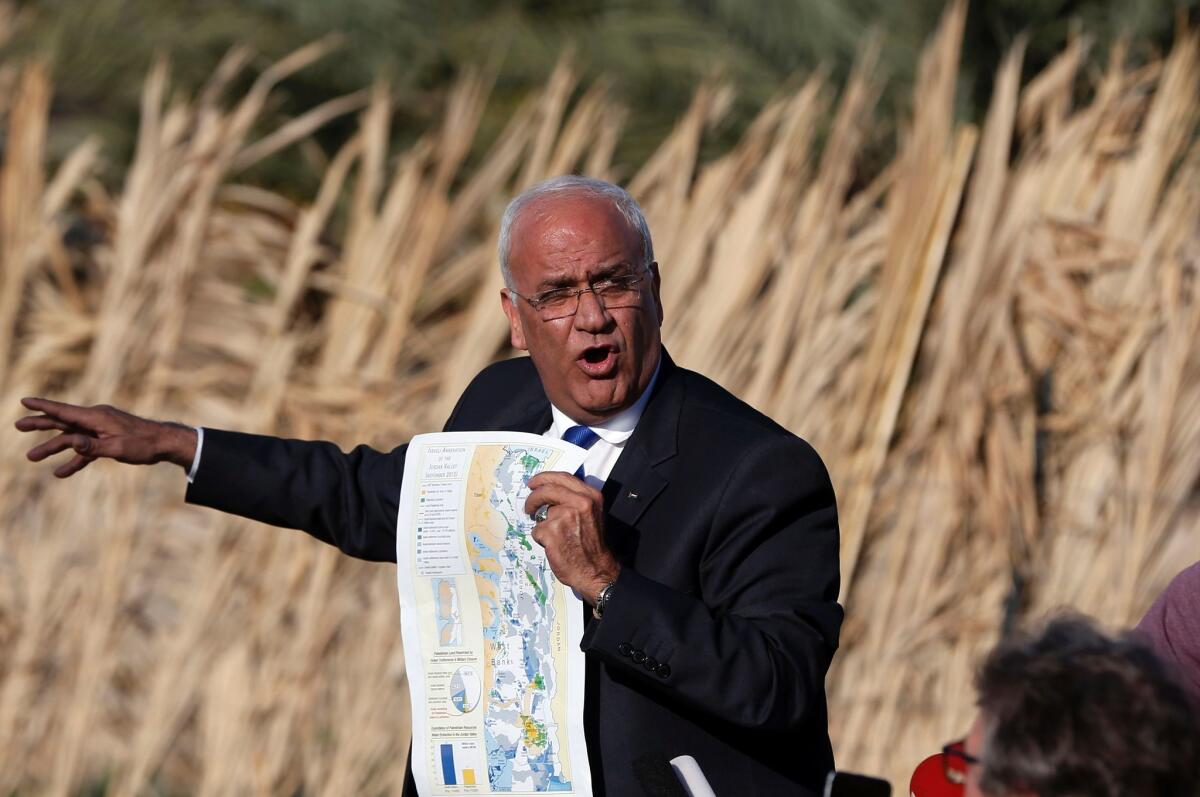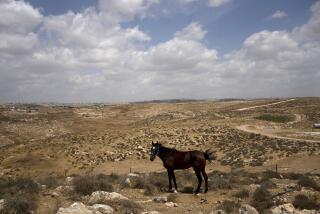Israel plan could lead to more Jewish settlements in occupied West Bank

Saeb Erekat, a Palestinian diplomat, shows a map as he addresses journalists Jan. 20 in the West Bank city of Jericho about Israel’s plans for more Jewish settlements.
Reporting from Jerusalem — In a move that could lead to construction of more Jewish settlements, Israel plans to annex 370 acres of agricultural land in the occupied West Bank near the city of Jericho.
The land has been under Israeli control since the Six Day War of 1967 and was already being farmed by members of the neighboring Etzion settlements, which are widely considered to be illegal under international law.
Formal annexation would continue a pattern of Israeli expansion that has been condemned by the U.S. and other world powers because it dampens the prospects for creation of a Palestinian state, which they view as the best hope for a lasting peace.
See more of our top stories on Facebook >>
Israeli Army Radio quoted a defense ministry report describing the plan as “a very sensitive issue which will likely garner harsh critique from Europe and the United States, and of course from the Palestinian Authority.”
The Cabinet is expected to quickly approve the plan, which was authorized in a declaration signed Wednesday morning by Israeli Prime Minister Benjamin Netanyahu and Defense Minister Moshe Yaalon, the radio station reported.
The defense ministry and the prime minister’s office declined to comment. But the Coordination of Government Activities in the Territories — the Israeli military body that oversees the occupied West Bank — confirmed the plan.
It would be the largest annexation since August 2014, when Israel incorporated nearly 1,000 acres in the West Bank in response to the nearby kidnapping and murder of three Israeli teenagers months earlier.
Palestinian leaders quickly condemned the new plan.
“Israel is challenging the international will and consensus because it can,” said Husam Zomlot, a senior aid to Palestinian Authority President Mahmoud Abbas, who called for sanctions or other international action. “Unfollowed international statements and resolutions do not mean much in Tel Aviv.”
Saeb Erekat, a top Palestinian diplomat, told reporters the Palestinian Liberation Organization opposed the plan and would include it in a raft of objections to the United Nations Security Council on Israel’s settlement policy.
U.N. Secretary-General Ban Ki-moon on Thursday denounced the move toward more settlements.
“Settlement activities are a violation of international law and run counter to the public pronouncements of the government of Israel supporting a two-state solution to the conflict,” Ban said in a statement.
International dissatisfaction with the Netanyahu government and its settlement policy had already been running high.
Two day before the news broke about the annexation plans, the U.S. ambassador to Israel, Dan Shapiro, said that Washington was “concerned and perplexed” by Israel’s settlement policy and that it raised “honest questions about Israel’s long-term intentions.”
“This government and previous Israeli governments have repeatedly expressed support for a negotiated settlement that would involve mutual recognition and separation,” he said. “Yet separation will become more and more difficult if Israel continues to expand settlements.”
Also this week European Union foreign ministers approved a resolution affirming that they do not consider the territories captured in 1967 to be part of Israel.
The Israeli government has said its settlement policy is legal under a law stating that land left uncultivated for a certain period becomes government property. It has shown little intention of stopping.
“We built in the past. We’re building in the present. We will build in the future,” the defense minister told reporters last fall.
Political analysts said the policy is driven by the government’s conservative base of support.
“Netanyahu and Yaalon are playing tough guys in order to win some credit among right-wing voters,” said Dror Etkes, a researcher who studies — and opposes — settlement expansion.
The last round of talks between Israelis and Palestinians on a two-state solution broke down in April 2014. Palestinians seek to form an independent state in the West Bank and Gaza Strip, with East Jerusalem as its capital.
Violence has escalated since October, with 25 Israelis, an Eritrean and a U.S. citizen killed in stabbings, shooting and car-rammings, and at least 150 Palestinians — including 94 that Israel says were assailants — killed in Israeli military operations.
Shuttleworth is a special correspondent.
ALSO
U.S.-bound Cuban migrants stranded in Costa Rica camps
British inquiry finds Putin probably OK’d killing of ex-agent Litvinenko
Gunmen, suicide bomber attack restaurant in Somali capital; at least 3 dead
More to Read
Sign up for Essential California
The most important California stories and recommendations in your inbox every morning.
You may occasionally receive promotional content from the Los Angeles Times.










